|
|
|
Sort Order |
|
|
|
Items / Page
|
|
|
|
|
|
|
| Srl | Item |
| 1 |
ID:
089512


|
|
|
|
|
| Publication |
2009.
|
| Summary/Abstract |
Mediating regional conflict in Asia is a delicate art. It requires an acute understanding of the unique mediation culture in the region. China's mediation in the nuclear crisis on the Korean Peninsula reveals key elements of this art and offers useful lessons. China's experience illustrates that an influential but neutral and harmony-oriented mediator is critical in the Asian context. It is equally essential for the mediator to (1) abide by the principle of noninterference in other countries' internal affairs while maintaining active intervention as dispute escalates, (2) stand ready to nudge those being mediated toward action when necessary to advance peaceful negotiations, (3) establish an optimal environment to foster communication and reduce hostility between the major parties in dispute, (4) serve as an honest broker but remain firm in its own position and cautiously take initiatives to guide the talks, (5) advocate a step-by-step approach to the negotiation process, and (6) aim for the outcome of negotiations to be a give-and-take agreement. Although Asia is a conflict-prone region, Asians traditionally confuse mediation with meddling. As a result, non-Asians often try to serve as mediators for Asia. For more effective mediations, it is essential that Asians rediscover their useful mediation skills and that non-Asians better understand the Asian art of mediation when they act as mediator.
|
|
|
|
|
|
|
|
|
|
|
|
|
|
|
|
| 2 |
ID:
134079
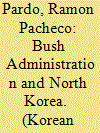

|
|
|
|
|
| Publication |
2014.
|
| Summary/Abstract |
Why did the George W. Bush Administration change its policy toward North Korea from confrontation to accommodation during the second nuclear crisis? This article answers the question by analyzing how and why a coalition-including Bush Administration doves, China, Russia, South Korea and, at times, Japan and North Korea-worked together to overcome the reticence of Bush Administration hawks to engage with Pyongyang. Building on the soft balancing, bureaucratic politics, and transgovernmental coalitions literature, this article explains how the Six-Party Talks served this coalition to understand the extent to which they shared goals and policies. Aware of the divisions within the Bush Administration regarding policy toward North Korea, the five other parties to the talks were able to undermine the preferred policies of U.S. hawks while supporting the policies of doves. Thus, rather than determining Washington's behavior, this coalition laid the ground for U.S. officials supportive of accommodation to upload their preferences into official Bush Administration's policy. This article therefore also sheds light on how soft balancing can be used by third parties to influence the decision-making process in the United States.
|
|
|
|
|
|
|
|
|
|
|
|
|
|
|
|
| 3 |
ID:
078645
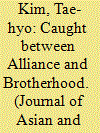

|
|
|
|
|
| Publication |
2007.
|
| Summary/Abstract |
A cost-benefit analysis leads to the conclusion that South Korea's search for non-violent responses to the North Korean nuclear issue causes a dilemma for Seoul. It must balance its security policies toward Washington and Pyongyang, and that dilemma can be resolved only when the North Korean nuclear problem, the most critical and the most difficult hurdle, is resolved. In analyzing critical variables that will determine the success or failure of the six-party talks multilateral approach, this article challenges the central tenet of cooperation theories: if a sufficient number of countries collaborate, they can achieve preventive diplomacy. Cooperation to dismantle the North Korean nuclear program will be difficult due to backsliding (`sanction busting') by concerned countries
|
|
|
|
|
|
|
|
|
|
|
|
|
|
|
|
| 4 |
ID:
073539
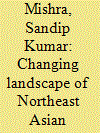

|
|
|
|
|
| Publication |
2006.
|
| Summary/Abstract |
While the six-party talks about the North Korean nuclear programme seem to have come to a standstill, Sandip Kumar Mishra points out the relations between the two Koreas have significantly improved while South Korea has grown closer to China and to Japan, despite periodic frictions. The "peaceful rise" of China as the dominant power is causing alarm in Tokyo and Washington, prompting Japan to build up its military might. Taiwan on the other hand, seems to grow ever more dependent on China.
|
|
|
|
|
|
|
|
|
|
|
|
|
|
|
|
| 5 |
ID:
075780
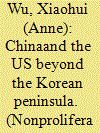

|
|
|
|
|
| Publication |
2006.
|
| Summary/Abstract |
China-U.S. cooperation over the most difficult security problem in Northeast Asia-the North Korean nuclear issue-in essence projects its bigger power game amid the tectonic shifts of Asian geopolitics. The nuclear issue affords a test case to gauge the future posture of China and the United States in East Asia and their partnership in that conflict-prone region. Approaches to resolving this issue must take into account the geopolitical realignment of Asia, Washington's reorientation of relations with its Asian allies, and China's rise as an influential regional player and the subsequent regional response. However, the long-standing mistrust between China and the United States is contributing to a lack of substantial progress in Korean nonproliferation efforts. The declared nuclear test by Pyongyang further put the denuclearization cooperation between China and the Unites States on the line. China-U.S. cooperation in denuclearizing Pyongyang may either produce lasting stability for the region or create ''collateral damage,'' with the North Korean issue paling in comparison.
|
|
|
|
|
|
|
|
|
|
|
|
|
|
|
|
| 6 |
ID:
099605
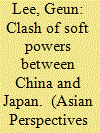

|
|
|
|
|
| Publication |
2010.
|
| Summary/Abstract |
This article argues that during the Six Party Talks on North Korea, China adroitly used its diplomacy to produce "soft-power synergy" while Japan became stuck with a "soft-power dilemma." Soft-power synergy refers to an outcome within which a success of an outward (foreign) soft-power strategy brings about simultaneous success of inward (domestic) soft-power strategy. On the other hand, soft-power dilemma denotes an outcome where a success of outward (or inward) soft-power strategy produces failure or negative influences in the inward (or outward) soft-power strategy. Borrowing from Robert Putnam's two-level game metaphor, this article tries to reveal the two-level dynamics of soft power by developing a refined conceptual framework of soft power and also by explicating a case study of Chinese and Japanese diplomacy at the Six Party Talks.
|
|
|
|
|
|
|
|
|
|
|
|
|
|
|
|
| 7 |
ID:
186806
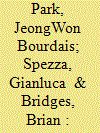

|
|
|
|
|
| Summary/Abstract |
The article examines the European Union (EU)'s policy toward and interactions with North Korea (DPRK) in order to answer the question, "To what extent, despite prima facie ruptures in the relationship, has the EU been engaged with the DPRK, which is conventionally understood as an unreliable state." Although the EU is seemingly inactive in North Korean affairs, yet it is a powerful institution that can play a significant role in the peacemaking process in Asia including on the Korean peninsula. This article explores, firstly, how the EU's policy toward Asia has evolved historically; secondly, how far such an agenda and principles have been implemented in the North Korean context; and finally, the extent to which previous practices pave the way for the two parties to be included in the process of forming a kind of extended regional governance in future. A common view is that the EU's strategical/political motivation for getting involved in North Korean affairs is negligible due to a lack of economic interests to counterbalance high political risks. This article highlights that, contrary to the common understanding of its soft issue-focused approach to Asia, the EU has been persistently engaged in DPRK affairs, notwithstanding the significant structural barriers. This role underpins the EU's growing intention and potential to enhance interactions under the aegis of comprehensive security (third generation cooperation) covering the economic, social, cultural, and human security-focused aspects of the relationship.
|
|
|
|
|
|
|
|
|
|
|
|
|
|
|
|
| 8 |
ID:
107162
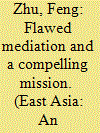

|
|
|
|
|
| Publication |
2011.
|
| Summary/Abstract |
This paper examines China's role in the Six-Party Talks, a multilateral initiative with the aim of denuclearising North Korea. As North Korea's behaviour has become increasingly provocative, evidenced by the Cheonan and Yeonpyeong Incidents and the newly unveiled uranium enrichment plant at Yeonbyon, China's indecision in dealing with the deteriorating situation has dramatically undermined Beijing's ability to continue successfully to play the leading mediator role. Yet if China fails to take decisive action now, the consequences could be dire. Further deterioration in North Korea's behaviour could trigger a nuclear arms race, severely hamper regional economic development and even create a geopolitical split in East Asia, leading to a confrontation between the US, South Korea and Japan acting together on one side, and China, Russia and North Korea aligned on the other. The factors that have prevented China from making further progress in the diplomatic process are many and various and this paper will reveal the complexity of the North Korean issue for China. Foreign academics and policy makers have tended to attribute China's indecision over North Korea to China putting its own security interests first. But this is far too simplistic a picture of the complex relationship that China has with North Korea. There are a host of factors at work that need to be taken into account to understand the present impasse in the diplomatic process. These factors include China's emotional ties to North Korea and empathy with its position as the weakest party in the Talks, the conflicting attitudes within the Chinese government itself towards the North, and the competing interests and lack of trust between the different stakeholders. It seems that for the foreseeable future, the North Korean issue will continue to plague Chinese foreign policy until all the parties involved act as a collaborative body to reach a consensus on how to resolve the situation.
|
|
|
|
|
|
|
|
|
|
|
|
|
|
|
|
| 9 |
ID:
073083


|
|
|
| 10 |
ID:
130548
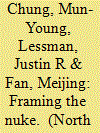

|
|
|
|
|
| Publication |
2014.
|
| Summary/Abstract |
Purpose-This cross-national study examines differences in news coverage of North Korea's first 2006 nuclear test in newspapers from the countries involved in the six-party talks with North Korea.
Design/methodology/approach-This population study is based on a quantitative content analysis of 564 newspaper articles from the highest-circulation native-language daily newspapers in countries involved in the six-party talks: the United States, China, South Korea, Japan, and Russia.
Findings-The framing analysis provides the significant differences of the news coverage: the U.S. newspaper demonstrated the strongest war journalism framing, the Chinese newspaper the unanimous peace journalism framing, the Japanese and Russian newspapers strong peace journalism framings, and the South Korean newspaper the strongest neutral framing.
Practical implications-This study found that the highest circulated newspapers of the countries involved in the six-party talks used different frames covering North Korea's first nuclear weapons test.
|
|
|
|
|
|
|
|
|
|
|
|
|
|
|
|
| 11 |
ID:
075463
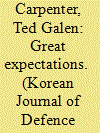

|
|
|
| 12 |
ID:
078646
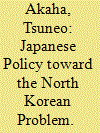

|
|
|
|
|
| Publication |
2007.
|
| Summary/Abstract |
North Korea became an urgent problem for Japan as a result of the 1994 nuclear crisis in North Korea, the 1998 missile launch over Japan and the 2003-4 nuclear crisis. At the historic Tokyo-Pyongyang summit in September 2002, both sides acknowledged the need to solve the security issues surrounding the Korean Peninsula through peaceful, multilateral efforts. However, the issue of North Korean abduction of Japanese citizens in earlier decades intensified Japanese sentiment against the North and this issue halted bilateral normalization talks. Japan has participated in six-party talks on the nuclear issue since 2004, but its distinct bilateral interests vis-à-vis North Korea, South Korea and the United States limit its influence in the multiparty engagement.
|
|
|
|
|
|
|
|
|
|
|
|
|
|
|
|
| 13 |
ID:
096032
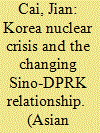

|
|
|
|
|
| Publication |
2010.
|
| Summary/Abstract |
When the DPRK conducted its first nuclear test on October 9, 2006, the second Korea nuclear crisis reached a climax, but almost everybody still believed in that North Korea was just playing a political card. After it conducted a second nuclear test on May 25, 2009, most people changed their thoughts and concluded that the Six Party Talks which aimed to solve the crisis are a total failure. This article analyzes the reasons and purposes for the DPRK's nuclear tests, considers the origin and development of the Six Party Talks, and concludes that the talks, while frustrating to various parties, have not been a total failure since they were moving in the right direction. The article examines the changing Sino-DPRK relationship and concludes that China should develop a long-term strategy toward the Korean peninsula and change its diplomatic policy toward the DPRK.
|
|
|
|
|
|
|
|
|
|
|
|
|
|
|
|
| 14 |
ID:
073571
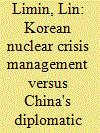

|
|
|
| 15 |
ID:
171789
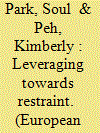

|
|
|
|
|
| Summary/Abstract |
The emergence of new nuclear aspirants has posed a great threat to the post-Cold War global non-proliferation regime. These states have adopted a nuclear hedging strategy that has been deemed both strategically risky and politically difficult to maintain. Yet, hedging has not automatically resulted in nuclearisation. We analyse the conditions under which a nuclear hedger shifts its nuclear policy towards one of restraint. Drawing insights from prospect theory, we argue that a nuclear policy shift occurs when a nuclear hedger gains an asymmetric leverage vis-à-vis its adversary. Specifically, a hedging strategy that is based on loss aversion will only be abandoned when a shift in the nuclear aspirant's reference point occurs during negotiations. To test our theoretical arguments, we conduct an in-depth case study of North Korea's nuclear policies throughout the 1990s and 2000s. The empirical study of the changes in North Korea's negotiating stance during the Agreed Framework negotiations and the Six-Party Talks supports our asymmetric leverage thesis. We conclude with broad policy implications for the non-proliferation regime.
|
|
|
|
|
|
|
|
|
|
|
|
|
|
|
|
| 16 |
ID:
073631
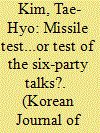

|
|
|
| 17 |
ID:
075345
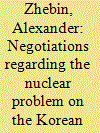

|
|
|
| 18 |
ID:
097348


|
|
|
| 19 |
ID:
092506
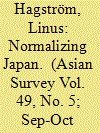

|
|
|
| 20 |
ID:
081865
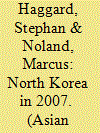

|
|
|
|
|
| Publication |
2008.
|
| Summary/Abstract |
The year 2007 witnessed a gradual rapprochement between North Korea and the world, reflecting changes both in the country's external environment and domestic political economy. Key markers were the resumption of the Six-Party Talks and the second North-South summit. Whether these developments will endure depends largely on North Korean intentions
|
|
|
|
|
|
|
|
|
|
|
|
|
|
|
|
|
|
|
|
|